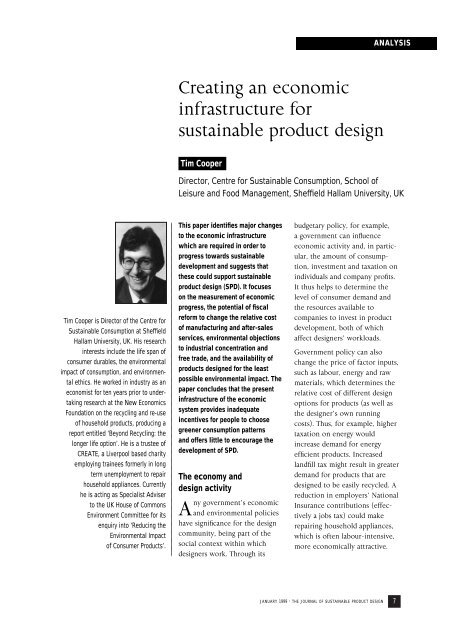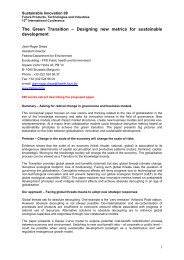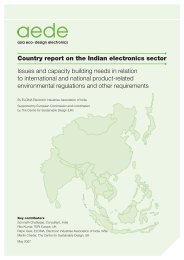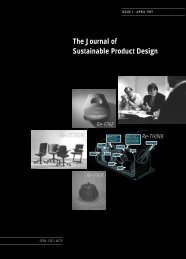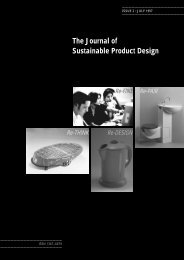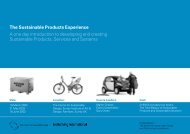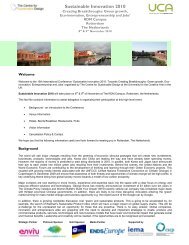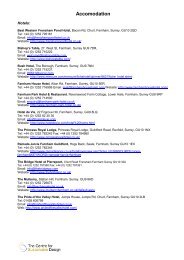acrobat JSPD 8 - The Centre for Sustainable Design
acrobat JSPD 8 - The Centre for Sustainable Design
acrobat JSPD 8 - The Centre for Sustainable Design
You also want an ePaper? Increase the reach of your titles
YUMPU automatically turns print PDFs into web optimized ePapers that Google loves.
Tim Cooper is Director of the <strong>Centre</strong> <strong>for</strong><br />
<strong>Sustainable</strong> Consumption at Sheffield<br />
Hallam University, UK. His research<br />
interests include the life span of<br />
consumer durables, the environmental<br />
impact of consumption, and environmental<br />
ethics. He worked in industry as an<br />
economist <strong>for</strong> ten years prior to undertaking<br />
research at the New Economics<br />
Foundation on the recycling and re-use<br />
of household products, producing a<br />
report entitled ‘Beyond Recycling: the<br />
longer life option’. He is a trustee of<br />
CREATE, a Liverpool based charity<br />
employing trainees <strong>for</strong>merly in long<br />
term unemployment to repair<br />
household appliances. Currently<br />
he is acting as Specialist Adviser<br />
to the UK House of Commons<br />
Environment Committee <strong>for</strong> its<br />
enquiry into ‘Reducing the<br />
Environmental Impact<br />
of Consumer Products’.<br />
Creating an economic<br />
infrastructure <strong>for</strong><br />
sustainable product design<br />
Tim Coopern<br />
This paper identifies major changes<br />
to the economic infrastructure<br />
which are required in order to<br />
progress towards sustainable<br />
development and suggests that<br />
these could support sustainable<br />
product design (SPD). It focuses<br />
on the measurement of economic<br />
progress, the potential of fiscal<br />
re<strong>for</strong>m to change the relative cost<br />
of manufacturing and after-sales<br />
services, environmental objections<br />
to industrial concentration and<br />
free trade, and the availability of<br />
products designed <strong>for</strong> the least<br />
possible environmental impact. <strong>The</strong><br />
paper concludes that the present<br />
infrastructure of the economic<br />
system provides inadequate<br />
incentives <strong>for</strong> people to choose<br />
greener consumption patterns<br />
and offers little to encourage the<br />
development of SPD.<br />
<strong>The</strong> economy and<br />
design activity<br />
Any government’s economic<br />
and environmental policies<br />
have significance <strong>for</strong> the design<br />
community, being part of the<br />
social context within which<br />
designers work. Through its<br />
JANUARY 1999 · THE JOURNAL OF SUSTAINABLE PRODUCT DESIGN<br />
ANALYSIS<br />
Director, <strong>Centre</strong> <strong>for</strong> <strong>Sustainable</strong> Consumption, School of<br />
Leisure and Food Management, Sheffield Hallam University, UK<br />
budgetary policy, <strong>for</strong> example,<br />
a government can influence<br />
economic activity and, in particular,<br />
the amount of consumption,<br />
investment and taxation on<br />
individuals and company profits.<br />
It thus helps to determine the<br />
level of consumer demand and<br />
the resources available to<br />
companies to invest in product<br />
development, both of which<br />
affect designers’ workloads.<br />
Government policy can also<br />
change the price of factor inputs,<br />
such as labour, energy and raw<br />
materials, which determines the<br />
relative cost of different design<br />
options <strong>for</strong> products (as well as<br />
the designer’s own running<br />
costs). Thus, <strong>for</strong> example, higher<br />
taxation on energy would<br />
increase demand <strong>for</strong> energy<br />
efficient products. Increased<br />
landfill tax might result in greater<br />
demand <strong>for</strong> products that are<br />
designed to be easily recycled. A<br />
reduction in employers’ National<br />
Insurance contributions (effectively<br />
a jobs tax) could make<br />
repairing household appliances,<br />
which is often labour-intensive,<br />
more economically attractive.<br />
7


